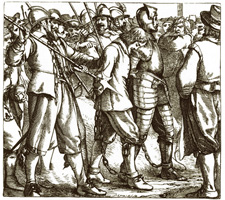When this Pickthank had told his tale, the Judge directed his speech to the prisoner at the bar, saying, You runagate, heretic, and traitor, have you heard what these honest gentlemen have witnessed against you?
Faithful: May I speak a few words in my own defense?
Judge: Sirrah! sirrah! You deserve to live no longer, but to be slain immediately upon the place; yet, that all men may see our gentleness towards you, let us hear what you, vile runagate, have to say.
Faithful: 1. I say, then, in answer to what Mr. Envy hath spoken, I never said aught but this, That what rule, or laws, or customs, or people, were flat against the Word of God, are diametrically opposite to Christianity. If I have said amiss in this, convince me of my error, and I am ready here before you to make my recantation.
2. As to the second, to wit, Mr. Superstition, and his charge against me, I said only this, That in the worship of God there is required a Divine faith; but there can be no Divine faith without a Divine revelation of the will of God. Therefore, whatever is thrust into the worship of God that is not agreeable to Divine revelation, cannot be done but by a human faith, which faith will not be profitable to eternal life.
3. As to what Mr. Pickthank hath said, I say (avoiding terms, as that I am said to rail, and the like) that the prince of this town, with all the rabblement, his attendants, by this gentleman named, are more fit for a being in hell, than in this town and country: and so, the Lord have mercy upon me!
 As soon as Envy, Superstition and Pickthank finish bringing their accusations against Faithful, the judge is ready to pronounce his sentence. Faithful’s guilt is assumed. Lord Hate-good speaks of the witnesses as “honest gentlemen” while derisively addressing Faithful as a “runagate, heretic, and traitor.” Yet Faithful makes a plea to speak in his own defense.
As soon as Envy, Superstition and Pickthank finish bringing their accusations against Faithful, the judge is ready to pronounce his sentence. Faithful’s guilt is assumed. Lord Hate-good speaks of the witnesses as “honest gentlemen” while derisively addressing Faithful as a “runagate, heretic, and traitor.” Yet Faithful makes a plea to speak in his own defense.
Faithful’s reply to his accusers points us to a core theme of The Pilgrim’s Progress: the centrality of God’s Word. Again and again throughout the allegory Bunyan takes us to the Bible. It is the book that Christian is reading at the beginning of the story that warns him of the coming judgment. Its promises are the “good and substantial steps” through the Slough of Despond. It is the Shining Light that shows the way to the Gate. It is the House of the Interpreter where Christian is shown “excellent things.” It is the “records of greatest antiquity” brought out for instruction at Palace Beautiful. And it is the Light of Day that helps Christian make his way to the end of the valley.
Now in Vanity Fair, the Word of God is Faithful’s strong defense. His three answers highlight the primacy of Scripture in life, worship and conscience:
I. We must judge our lives on the basis of God’s Word.
Envy is offended because the teachings of Faithful (and Christianity) are opposed to many of the customs and practices of the town. Faithful affirms that any “rule or laws or customs or people” that are contrary to God’s Word are in opposition to the Christian faith.
If we are to live and walk in ways that are pleasing to God, we can’t invent our own standards; we must look to His Word. It is the Bible that instructs us in righteousness:
“All Scripture is given by inspiration of God, and is profitable for doctrine, for reproof, for correction, for instruction in righteousness, that the man of God may be complete, thoroughly equipped for every good work” (2 Timothy 3:16–17).
Peter exhorts us to “heed” the Scriptures “as a light that shines in a dark place, until the day dawns and the morning star rises in your hearts” (2 Peter 1:19).
Your word is a lamp to my feet
And a light to my path.
(Psalm 119:105)
The entrance of Your words gives light;
It gives understanding to the simple.
(Psalm 119:130)
The law of the Lord is perfect, converting the soul;
The testimony of the Lord is sure, making wise the simple;
The statutes of the Lord are right, rejoicing the heart;
The commandment of the Lord is pure, enlightening the eyes;
The fear of the Lord is clean, enduring forever;
The judgments of the Lord are true and righteous altogether.
More to be desired are they than gold,
Yea, than much fine gold;
Sweeter also than honey and the honeycomb.
Moreover by them Your servant is warned,
And in keeping them there is great reward.
(Psalm 19:7–11)
God’s Word is most valuable and most profitable to us as we journey through this life. When the world entices us to believe or do something contrary to Scripture, we must listen to God (Acts 4:19). We must continue to speak the Word “with all boldness” (Acts 4:29).
II. We must judge our worship of God on the basis of His Word.
Superstition is offended because the teachings of Faithful (and Christianity) degrade his own religious practices and ideas of how God should be worshipped. Faithful affirms that our worship must come from divine faith that grows in the light of divine revelation. We come to God by grace through faith, which is a gift of God (Ephesians 2:8). His Spirit enlivens and empowers us. And we come in accordance with God’s truth revealed to us in His Word. His Spirit illumines and teaches us.
If we are to worship God in Spirit and in Truth, we need the work of His Spirit and we must look to His Word for guidance and direction. We can’t invent our own ways and methods of approaching God. We must know the Scriptures and submit to the Scriptures as the Spirit brings understanding.
The London Baptist Confession of Faith of 1689 provides a good explanation of this. This confession was written by Particular Baptists in England in 1677, a year before Bunyan first published The Pilgrim’s Progress. It was officially adopted in 1689. The first chapter of the confession is about the Scriptures. It begins by saying that we must look to God’s Word to know how to be saved from sin and walk in a way pleasing to God. The opening sentence reads: “The Holy Scripture is the only sufficient, certain, and infallible rule of all saving knowledge, faith, and obedience.”
Chapter 22 speaks specifically on worship:
“The light of nature shows that there is a God, who hath lordship and sovereignty over all; is just, good, and doth good unto all; and is therefore to be feared, loved, praised, called upon, trusted in, and served, with all the heart and all the soul, and with all the might. But the acceptable way of worshipping the true God is instituted by Himself, and so limited by His own revealed will, that He may not be worshipped according to the imaginations and devices of men, nor the suggestions of Satan, under any visible representation, or any other way not prescribed in the Holy Scriptures” (1689 London Baptist Confession, 22:1).
This is what has been called the Regulative Principle of worship. It simply means that our worship is to be regulated by the Word of God. The Bible must set the boundaries and define the way in which we are to seek God in worship.
III. We must submit our conscience to the Word of God.
Pickthank is offended because the teachings of Faithful (and Christianity) are an affront to fallen human nature. Faithful affirms that in our fallen nature we are at enmity against God.
Because the carnal mind is enmity against God; for it is not subject to the law of God, nor indeed can be. So then, those who are in the flesh cannot please God (Romans 8:7–8).
By insisting on the authority of God’s Word, Faithful has exposed the terrible truth that the town of Vanity will not bear to hear. Outside of Christ we stand condemned before God, deserving of wrath and hell.
Though Faithful knows that the witnesses, the judge and the town itself all stand against him, he is firm in his conviction to stand on the Word of God. He won’t violate his conscience by disowning or disavowing the truth. He concludes with the prayer “the Lord have mercy upon me!” Faithful’s prayer is echoed in church history when Martin Luther, defending his own convictions on April 18, 1521 at the Diet of Worms, declared:
“Unless I am convinced by testimonies of the Scriptures or by clear arguments that I am in error—for popes and councils have often erred and contradicted themselves—I cannot withdraw, for I am subject to the Scriptures I have quoted; my conscience is captive to the Word of God. It is unsafe and dangerous to do anything against one’s conscience. Here I stand; I cannot do otherwise. So help me God.”
May God grant us the boldness and steadfastness of Faithful to hold true to His Word.
A Guide to John Bunyan’s The Pilgrim’s Progress
See TOC for more posts from this commentary
The text for The Pilgrim’s Progress and images used are public domain
Notes and Commentary ©2017 Ken Puls
Unless otherwise indicated, all Scripture quotations are from the New King James Version (NKJV) ©1982 by Thomas Nelson, Inc.








